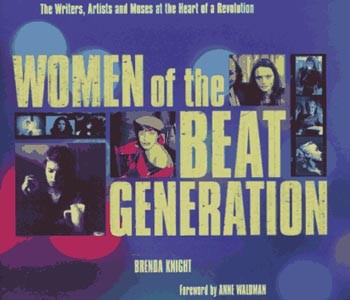Other Voices
Women of the Beat Generation.
Author Brenda Knight talks about ‘Women of the Beat Generation’
By Patrick Sullivan
ONCE UPON A TIME, not so very long ago, the phrase “Women of the Beat Generation” would have elicited either honest bewilderment or frank derision. Millions of readers have, at one time or another, howled along with Allen or gone on the road with Jack. But women in the Beats? There really weren’t any of note.
Or so said many people when San Francisco scholar Brenda Knight began asking what role female writers and artists played in the 1950s movement that blew the dust of formalism off American culture. But after extensive research and scores of interviews with women Beats and their associates, Knight assembled a unique volume that uncovered a hidden history and revolutionized the way we look at an entire era.
Women of the Beat Generation (Conari; $14.95) was first published in 1996 to critical acclaim. The unique collection of writing, profiles, and rare photos went on to win the American Book Award in 1997 and is now out in a new paperback edition. In short order, the book has brought recognition or renewed attention to such female Beats as Diane Di Prima, Hetti Jones, and Ruth Weiss.
“They were always there,” says Knight over the phone from her job with a San Francisco publishing company. “It was just like they were sitting in a dark room and needed the light turned on. That’s been the most gratifying thing about writing this book.”
Decades after their heyday, the Beats are still with us. On the Road has consistently sold some 40,000 copies annually, and recent years have seen a steep rise in popular interest in the era. Knight’s book fed that growing hunger by providing readers with Beat writing that was hard to find or, in some cases, totally unpublished. Moreover, the work of these women was formed and cultivated far from the mainstream success and media attention that many believe helped kill the rest of the movement. That relative obscurity, Knight argues, means that the work of these women is still raw, immediate, and shocking–the very essence of Beat.
“The women were never overexposed, so they didn’t become sick of their status.” says Knight. “They were never transformed into icons or clichés. They remained, in a sense, pure.”
If the art of female Beats is fascinating, their lives are certainly no less so, as Knight amply demonstrates in 40 profiles of these deeply individualistic women. Among the most compelling are the story of Mary Norbert Korte, a Catholic nun who left the convent for life as a poet and an environmental activist in Willits, and the tragic tale of Jan Kerouac–Jack’s only offspring–who struggled to figure out what it meant to be Kerouac’s daughter, but died before she could finish the third in a series of books about herself and her father.
So what drew Knight to the Beats in the first place? Several experiences inspired her, including a class on modern poetry she took from Michael Krasny. But she vividly recalls another important inspiration. As a graduate student instructor in Ohio, Knight used Allen Ginsberg’s poem America in a course she taught. A student complained because of the poem’s homosexual content, and in a disturbing echo of the 1957 attempt to censor Ginsberg’s Howl, university administrators tried to force Knight to remove the poem from the curriculum. She stuck to her guns and eventually prevailed, at the cost of becoming, in her words, “a pariah” in the community.
“That experience made me feel I was really bonded to the Beats,” Knight says. “I thought, ‘Now I know what it’s like to have poetry be a cause that can change your life.’ “
The continuing popularity of Women of the Beat Generation continues to amaze Knight. She thinks one explanation may be that our current age of hype and commercialism makes people appreciate the raw authenticity of the Beats now more than ever.
“I think young people especially are so unrelentingly battered by advertising, and the media itself is so corrupt,” Knight says. “They’re so tired of all the crap, and they’re looking for something real. You still find that in the Beats, men or women.”
Brenda Knight speaks Dec. 10 at 7 p.m. at Copperfield’s Cafe, 144 Kentucky St., Petaluma. For more information, call 762-8798.
From the December 10-16, 1998 issue of the Sonoma County Independent.
© Metro Publishing Inc.











